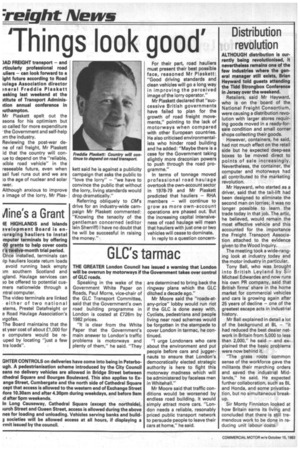Distribution revolution
Page 14

If you've noticed an error in this article please click here to report it so we can fix it.
ALTHOUGH distribution is currently being revolutionised, it nevertheless remains one of the few industries where the general manager still exists, Brian Hayward told guests attending the Tidd Strongbox Conference in Jersey over the weekend.
Retailers, said Mr Hayward, who is on the board of the National Freight Consortium, were causing a distribution revolution with larger stores requiring goods moved in a ready-forsale condition and small corner shops collecting their goods.
However, containers, he said, had not much effect on the retail side but he expected deep-sea boxes to be moved direct to points of sale increasingly. Nevertheless, the container, the computer and motorways had all contributed to the marketing revolution.
Mr Hayward, who started as a driver, said that the tail-lift had been designed to eliminate the second man on lorries; it was no longer possible to learn the trade today in that job. The artic, he believed, would remain the most effective vehicle and this accounted for the importance the Freight Transport Association attached to the evidence given to the Wood Inquiry.
The meeting took a wide-ranging look at industry today and the motor industry in particular.
Tony Ball, who was brought into British Leyland by Sir Michael Edwardes and now runs his own PR company, said that British firms' share in the home market for commercial vehicles and cars is growing again after 25 years of decline — one of the greatest escape acts in industrial history.
Mr Ball explained in detail a lot of the background at BL — "it had reduced the best dealer network in Britain from 5,000 to less than 2,000," he said — and explained that the basic problems were now behind it.
"The grass roots common sense of the workforce gave the militants their marching orders and saved the industrial Midlands," he said. He expected further collaboration, such as BL and Honda, and some privatisation, but no simultaneous breakup.
Sir Monty Finniston looked at how Britain earns its living and concluded that there is still tremendous work to be done in reducing unit labour costs.






















































































































